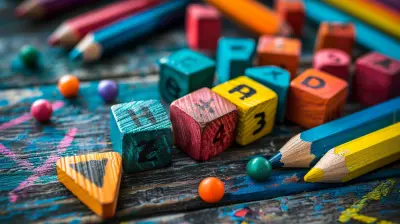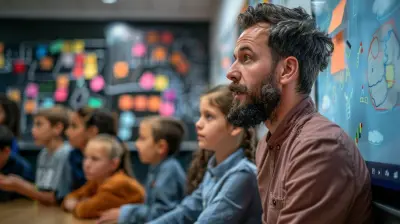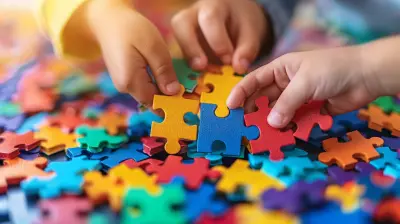The Power of Saying No: Protecting Your Energy in the Classroom
5 February 2025
Have you ever found yourself completely drained at the end of a school day, wondering where all your energy went? If you're a teacher, the answer is probably a resounding "yes." Teaching is one of the most rewarding yet physically and emotionally demanding professions out there. You're constantly giving—your time, your attention, your patience—all while juggling lesson plans, grading, and classroom management. But here's a question: how often do you say "no"?
It might seem like a simple word, but saying "no" can be one of the most powerful tools in your teaching arsenal. In a profession where you're expected to be "on" all the time, learning to set boundaries is crucial for preserving your energy, maintaining your mental health, and, ultimately, becoming a more effective educator.
In this article, we’ll dive deep into why saying "no" is so important, how it can protect your energy, and ways to implement it without feeling guilty. Ready? Let’s explore how the power of "no" can transform your teaching life.
Why Teachers Struggle to Say No
Let’s face it: teachers are natural givers. You're in this profession because you care—about your students, their success, and the impact you can make in their lives. So, it's no surprise that many teachers find it difficult to say "no," whether it's to their students, colleagues, or even themselves.But here's the thing: constantly saying "yes" can lead to burnout faster than you think. When you’re always agreeing to take on extra tasks, attend after-hours meetings, or stay late to help students, you're slowly chipping away at your own energy reserves.
The Pressure to Be "Super Teacher"
Do you ever feel like you need to be a superhero in the classroom? The pressure to be "Super Teacher" is real. Whether it’s internal or external, there’s often an expectation that you should be able to do it all—create engaging lesson plans, manage behavior, attend extracurricular activities, and still have time for grading and personal life.But here’s the truth: no one can do it all, and trying to do so is a recipe for exhaustion. The desire to be "everything to everyone" is admirable, but it’s not sustainable. Setting boundaries by saying "no" is not a weakness; it’s a form of self-preservation.
The Impact of Energy Drain on Your Performance
Imagine you’re a smartphone with a battery that starts at 100%. Every task you take on—whether it’s teaching a lesson, moderating a classroom, or attending a meeting—uses up a percentage of your battery. By the end of the day, if you haven’t recharged, you’re left running on empty.The same goes for your mental and emotional energy. When you don’t protect your energy, you run the risk of becoming ineffective, irritable, and ultimately, burned out.
Signs You're Running on Empty
You might not even realize how much you’re overextending yourself until your body starts sending you warning signals. Some common signs of energy drain include:- Constant fatigue: No matter how much sleep you get, you still feel tired.
- Irritability: You find yourself snapping at students or colleagues more often than usual.
- Lack of enthusiasm: The passion you once had for teaching feels like it's fading.
- Forgetfulness: You struggle to remember things or stay organized.
- Decreased creativity: Coming up with new lesson ideas feels like pulling teeth.
If any of this sounds familiar, it might be time to evaluate where your energy is going and how often you're saying "yes" when you should be saying "no."
The Power of Saying No: How It Protects Your Energy
Now that we’ve covered why saying no is difficult and the consequences of not doing it, let’s talk about how saying no can actually protect your energy and make you a more effective teacher.1. Preserving Mental and Emotional Energy
Teaching is an emotional job. You’re not just imparting knowledge; you’re also acting as a counselor, mentor, and sometimes, even a parent. By saying no to tasks or roles that don’t align with your primary responsibilities, you can preserve your mental and emotional energy for what really matters: your students.Think of it this way: each "yes" is a withdrawal from your emotional bank account. Too many withdrawals without deposits (like rest, relaxation, and self-care) will leave you emotionally bankrupt. Saying "no" helps you maintain a healthy balance.
2. Maintaining Focus on What Matters
Saying no allows you to prioritize what’s truly important. In a classroom setting, your focus should be on teaching, engaging with students, and fostering a positive learning environment.When you’re constantly saying yes to extra duties—like joining unnecessary committees or taking on additional administrative tasks—you’re diverting your focus from your primary goal: educating your students. By saying no, you’re protecting the quality of your teaching and ensuring that your energy is directed where it’s needed most.
3. Reducing Stress and Preventing Burnout
Burnout is a very real and very serious issue in the teaching profession. According to a 2021 report from the National Education Association, nearly 55% of teachers are considering leaving the profession due to stress and burnout.Saying no is one of the most effective ways to reduce stress and prevent burnout. When you set boundaries, you’re not only protecting your energy but also giving yourself the space to recharge. This might mean saying no to working late, no to checking emails after hours, or even no to helping a student during your lunch break. These small acts of self-preservation can make a huge difference in your mental health.
Practical Tips for Saying No in the Classroom
Okay, so we’ve established that saying no is important. But how do you actually do it, especially when it feels uncomfortable? Here are some practical tips for setting boundaries and saying no in a way that’s respectful and effective.1. Be Clear and Direct
When you say no, it’s important to be clear and direct. Don’t beat around the bush or offer lengthy explanations. A simple, polite "I’m unable to take that on right now" is often all that’s needed.For example, if a colleague asks you to join an after-school committee, you can say, "Thank you for thinking of me, but I’m unable to commit to that right now."
2. Offer an Alternative
If you feel uncomfortable saying no outright, offering an alternative can be a great middle ground. For instance, if a student asks for extra help after school and you’re already swamped, you could say, "I can’t stay after school today, but let’s schedule some time tomorrow during lunch."This way, you’re still helping, but on your own terms.
3. Set Boundaries Early On
One of the best things you can do is set boundaries early in the school year. Let your students, colleagues, and even administrators know what you are and aren’t available for. This might mean setting specific office hours or making it clear that you don’t check emails after a certain time.By setting these boundaries from the get-go, you’re creating a framework that makes it easier to say no when needed.
4. Practice Self-Compassion
Saying no can feel uncomfortable, especially if you’re used to being a people-pleaser. It’s important to practice self-compassion and remind yourself that you’re not being selfish by setting boundaries. In fact, by protecting your energy, you’re ensuring that you can show up as your best self for your students.What Happens When You Start Saying No
You might be wondering, "What happens if I start saying no more often?" The good news is that it’s usually not as scary as you think. In fact, you’ll likely find that people respect your boundaries more than you anticipated.Here are a few positive outcomes you can expect once you get comfortable with saying no:
- Increased respect: People will respect your time and energy more when they see that you value it yourself.
- Improved mental health: With fewer commitments, you’ll have more time for relaxation, self-care, and personal pursuits.
- Better teaching performance: When your energy isn’t spread too thin, you can give more to your students and improve the quality of your teaching.
- More time for yourself: Saying no creates space for you to recharge, pursue hobbies, and spend time with loved ones.
Remember, saying no isn’t about shutting people out—it’s about creating space for what truly matters.
Final Thoughts: Embrace the Power of No
The power of saying no lies in its ability to protect your most valuable resource: your energy. As a teacher, you’re constantly giving, and that’s what makes you amazing at what you do. But in order to keep giving, you need to take care of yourself first.Saying no doesn’t make you a bad teacher—it makes you a smart one. It’s not about doing less; it’s about doing what matters most. So the next time you feel overwhelmed or stretched too thin, remember that it’s okay to say no. In fact, it might be the best thing you can do for yourself and your students.
all images in this post were generated using AI tools
Category:
Teacher Burnout PreventionAuthor:

Bethany Hudson
Discussion
rate this article
15 comments
Melanie McKeever
Great insights! Setting boundaries is essential for teacher well-being.
March 16, 2025 at 12:26 PM

Bethany Hudson
Thank you! I completely agree—setting boundaries is vital for maintaining our well-being in the teaching profession.
Felicity McCullough
Thank you for this insightful article! It's a crucial reminder that setting boundaries is essential for our well-being and effectiveness as educators. Well said!
March 2, 2025 at 12:31 PM

Bethany Hudson
Thank you for your kind words! I'm glad you found the article helpful. Setting boundaries is indeed vital for our well-being.
Sydney Matthews
Thank you for this insightful article! Embracing the power of "no" is essential for educators. It truly helps preserve our energy and enhances our ability to support students effectively.
March 1, 2025 at 6:02 AM

Bethany Hudson
Thank you for your kind words! I'm glad the article resonated with you. Embracing "no" is indeed vital for sustaining our energy and effectiveness as educators.
Zephyrae Larsen
This article highlights a crucial aspect of teaching that often gets overlooked. Saying no is essential for maintaining balance and energy. Teachers must prioritize their well-being to create a positive classroom environment. Great read!
February 28, 2025 at 5:16 AM

Bethany Hudson
Thank you for your thoughtful feedback! I'm glad you found the article highlighting the importance of saying no for teacher well-being. It’s key to fostering a positive classroom!
Alexa Sharp
Yes to less stress!
February 27, 2025 at 1:57 PM

Bethany Hudson
Absolutely! Setting boundaries is key to maintaining our well-being.
Kason Hill
Ah, the art of saying no—a skill as essential as knowing where the coffee stash is hidden! Remember, every ‘no’ is a ‘yes’ to your own well-being. Protect your energy like you would a secret chocolate stash—because a happy teacher is a powerful teacher!
February 24, 2025 at 11:39 AM

Bethany Hudson
Absolutely! Prioritizing our well-being strengthens our ability to teach effectively. Thank you for highlighting the importance of safeguarding our energy!
Dusk Edwards
Great insights on the importance of setting boundaries! Saying no is crucial for maintaining energy and focus in the classroom. It empowers educators to prioritize their well-being, ultimately enhancing the learning environment for students. Would love to see more strategies on how to effectively communicate these boundaries!
February 24, 2025 at 5:10 AM

Bethany Hudson
Thank you for your thoughtful comment! I appreciate your interest and will definitely consider including more strategies for communicating boundaries in future pieces.
Paige Garcia
This article beautifully highlights the importance of setting boundaries. Saying no isn't selfish—it's a vital step in preserving our energy and passion for teaching. Thank you for shedding light on this essential aspect of education!
February 23, 2025 at 1:12 PM

Bethany Hudson
Thank you for your thoughtful comment! I’m glad you found the article helpful in emphasizing the importance of boundaries in teaching.
Colton Fisher
This article highlights the crucial importance of setting boundaries in education. Saying no can empower teachers to protect their well-being and energy, ultimately creating a healthier classroom environment for both educators and students. Great read!
February 22, 2025 at 6:05 AM

Bethany Hudson
Thank you for your thoughtful comment! I'm glad you found the article insightful and valuable for fostering a healthier classroom environment.
Brick O'Neal
This article highlights the importance of setting boundaries in the classroom. Saying no is vital for preserving energy and focus, ultimately fostering a more effective teaching environment.
February 18, 2025 at 8:20 PM

Bethany Hudson
Thank you for your insightful comment! I'm glad you found the emphasis on boundaries and saying no valuable for enhancing the teaching environment.
Tristan Simon
Empower yourself—set boundaries and thrive in teaching!
February 16, 2025 at 9:37 PM

Bethany Hudson
Thank you for your encouragement! Setting boundaries is essential for maintaining our energy and passion in teaching.
Arlo McFarland
This article highlights a crucial skill for educators: the power of saying no. By setting boundaries, teachers can protect their energy and prioritize their well-being, ultimately enhancing their effectiveness in the classroom. Embracing this practice fosters a healthier teaching environment for both educators and students.
February 15, 2025 at 4:57 AM

Bethany Hudson
Thank you for your insightful comment! I'm glad you found the article valuable in emphasizing the importance of setting boundaries for educators' well-being.
Victor Morris
This article effectively highlights the crucial role of setting boundaries in education. Saying no empowers educators to prioritize their well-being, ultimately fostering a healthier learning environment for both teachers and students.
February 13, 2025 at 12:08 PM

Bethany Hudson
Thank you for your insightful comment! I'm glad you found the article valuable in emphasizing the importance of boundaries for educators' well-being.
Thomas Maddox
Thank you for this insightful piece! Saying no is vital for maintaining our energy and passion in teaching. Truly empowering!
February 13, 2025 at 4:26 AM

Bethany Hudson
Thank you for your kind words! I'm glad you found the piece empowering. Prioritizing our energy is essential in teaching!
Henry Hall
Sometimes, saying no is the magic spell that transforms chaos into calm—abracadabra, energy saved for learning!
February 9, 2025 at 12:15 PM

Bethany Hudson
Absolutely! Saying no is crucial for preserving our focus and energy, allowing us to create a more peaceful and productive learning environment.
MORE POSTS

Encouraging Critical Thinking in Environmental Science

Empowering Teachers to Take Charge of Their Mental Health

Best Practices for Creating a Flipped Classroom

Breaking Down Barriers: How to Support Struggling Math Students

Key Safety Concerns for Schools in Rural and Urban Areas

The Role of Teachers in a Blended Learning Environment

How Teacher Teams Can Drive Innovation in Education

How to Stay Passionate About Teaching Throughout Your Career

Exploring Chemical Reactions with Everyday Kitchen Ingredients

How to Create a Behavior Intervention Plan for Students with Learning Disabilities